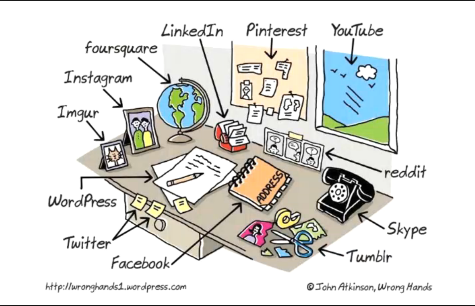Module 4. Digital Citizenship Week
DIGITAL CITIZENSHIP WEEK

Every year, the 3rd week of October is celebrated as DIGITAL CITIZENSHIP WEEK all over the
world so that students can use the internet more safely and rationally and become good digital
citizens.
You can also celebrate this week at your school as Model Digital Citizenship Week, plan
activities within this week and include families in these activities. During this week, you
can prepare posters with your students and organize a slogan or painting contest.
MODEL DIGITAL CITIZENSHIP WEEK

MONDAY:the Concept of Digital Citizenship
The best way to start this week is to tell your students what the Concept of Digital
Citizenship is, then, based on what you tell, you can write a good digital citizen and a bad
digital citizen scenario and let your students explore the scenario in which you will tell
about the right and wrong behaviors. For example;
1-A scenario can be designed in which there is a person who comes to share a news they find on
the internet without investigating the accuracy (bad digital citizen)

2-A scenario can be written in which a child who was exposed to bad words by a stranger he
encountered on the Internet and threatened to never tell his family, shares the situation with
his family (good digital citizen)
TUESDAY: Explanation of the Digital Footprint Concept
Explaining that every behavior done on the internet will stick to students like a tattoo and
cannot be undone and the destination cannot be inspected.
Ask students to write down the names or draw symbols of websites, social media accounts or
apps they like to enter on my digital footprint worksheets that you will distribute to
students. Give students enough time to think about where they left their footprints, and
realize and continue to think about how important it is to leave footprints. Post their
worksheets on the board so that they can talk to each other.

This activity will provide students with a more rational and concrete approach to the concept
of digital footprint and at the same time raise awareness so that they can become good digital
citizens of the future.
WEDNESDAY: Information Literacy

Explain that students should definitely check any information from different sources before
believing it, sharing it, or perhaps writing it as a homework topic.
THURSDAY:Internet Securty Must Haves

You can start this lesson by asking questions:
1-Have you ever received e-mail from someone you do not know?
2-What would you do if someone you do not know wants to add you as a friend on your social
media account?
3-If you receive an instant message from a person you do not know, how do you know if he is
telling the truth?
These questions will raise awareness of students to reflect on internet ethics and to be
prepared when they encounter such behaviors in their future lives.
FRIDAY:Digital communication and Cyber Bullying

You can start the lesson by asking how they communicate on the internet. Note these answers
as they are given. Probably, the majority of their answers will be social media accounts and
text messages. Ask them if they will always communicate in this way in their future career.
For example, it would be more elegant to use e-mail instead of a text message to request
something from a person whose seniority is superior.

It can also come up with a scenario for cyberbullying, and conclude that a person harassed by
a malicious person must be reported to an authorized or trusted adult.



